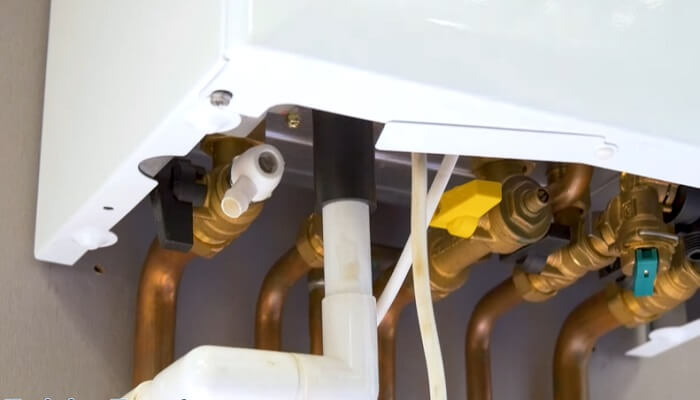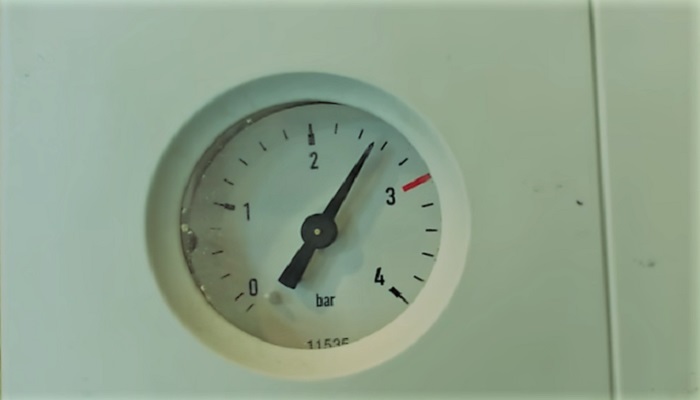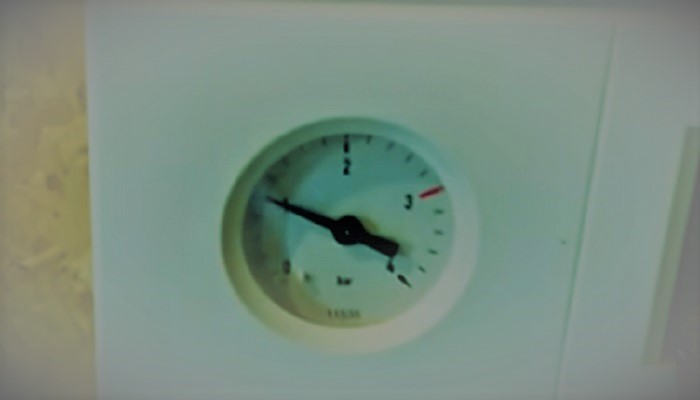| Note: This article may contain affiliate links, which means if you make a purchase following our links won’t cost you extra, but we may earn a commission. Learn more |
A boiler is a closed vessel in which water or other fluid is heated. The fluid does not necessarily boil. The heated or vaporized fluid exits the boiler for use in various processes or heating applications, including water heating, central heating, boiler-based power generation, cooking, and sanitation.
The boiler pressure is the pressure of the hot water in the boiler. This is usually around 1-2 bar for most domestic boilers but can be higher for commercial or industrial boilers. The pressure is important as it ensures that the boiler can heat the water to the correct temperature and also prevents the water from boiling over.
Boilers can be classified into the following configurations:
* Fire-tube boiler: In a fire-tube boiler, hot gases from a fire pass through one or more tubes running through a sealed container of water. The heat of the gases is transferred through the walls of the tubes by thermal conduction, heating the water and ultimately creating steam.
* Water-tube boiler: In a water-tube boiler, water circulates in tubes heated externally by hot gases from a furnace. The gases flow around the outside of the tubes and heat the water inside the tubes.
* Flash boiler: A flash boiler is a type of water-tube boiler in which the steam is produced by flash evaporation of water, hence the name.
* Thermal oil boiler: A thermal oil boiler uses heat energy in liquid form to generate steam, instead of using gases or liquid fuels.
* High pressure boiler: A high pressure boiler is a type of boiler that operates at a pressure above 80 bars. The pressure in a high pressure boiler is high enough to cause the water to boil. The water in a high pressure boiler is converted into steam. The steam is then used to power a turbine.
* Low pressure boiler: A low pressure boiler is a type of boiler that has a lower than average water pressure. This is generally defined as pressure below 15 pounds per square inch.
The pressure in a boiler is the result of the steam produced by the boiler pushing against the walls of the vessel in which the boiler is housed. The higher the pressure of the steam, the greater the force with which it pushes against the walls. The pressure of the steam also determines the temperature of the steam, with higher pressures resulting in higher temperatures.

The pressure in a boiler is measured by a pressure gauge on the side of the boiler. The reading should be between 1 and 2 bar. The boiler pressure should be between 1 and 2 bar. If the boiler pressure is too high, it could explode. If the boiler pressure is too low, the boiler will not work properly.
Hot Water Boiler Pressure Too High
If your home has a hot water boiler, then you know that it is responsible for providing hot water to your fixtures and appliances. But what happens when the pressure in your hot water boiler gets too high? Here are some symptoms of a hot water boiler with high pressure, and what you can do about it.
1. High Water Levels:
When the water level in your hot water boiler is too high, it can cause the pressure to increase. This is because there is more water than what is needed to fill the boiler, so the pressure has to compensate for the extra water. You can fix this problem by draining some of the water out of the boiler until the water level is back to normal.
2. Old or Dirty Boiler:
If your hot water boiler is old or dirty, it can also cause the pressure to increase. This is because the dirt and grime can build up on the inside of the boiler, which can restrict the flow of water. This can cause the water to become trapped and the pressure to build up. You can clean the boiler by flushing it out with a hose or by using a chemical cleaner.
3. Faulty Relief Valve:
If the relief valve on your hot water boiler is faulty, it can cause the pressure to increase. This is because the relief valve is responsible for releasing the pressure when it gets too high. If the valve is not working properly, the pressure can build up and cause the boiler to explode. You should have a professional replace the relief valve if it is not working properly.
4. Wrong Size Boiler:
If your boiler is the wrong size for your home, it can also cause pressure to increase. This is because a boiler that is too small will have to work harder to heat your home, which can cause the pressure to build up. Conversely, a boiler that is too large will not be able to heat your home properly, which can also cause the pressure to increase. You should have a professional help you choose the right size boiler for your home.

5. Thermostat Issues:
If the thermostat on your hot water boiler is not working properly, it can also cause the pressure to increase. This is because the thermostat is responsible for regulating the temperature of the water. If the thermostat is not working properly, or wrongly set, the water can get too hot, which can cause the pressure to build up. You should have a professional replace the thermostat if it is not working properly.
Hot Water Boiler Pressure Too Low
If your hot water boiler pressure is too low, there are a few possible reasons why. This can be a tricky problem to identify, but if you suspect a leak, it’s important to have a professional take a look. Finally, it’s possible that the water level in the boiler is too low. If this is the case, you’ll need to add more water to the system.
1. Leaks in the System:
One of the most common reasons for a drop in hot water boiler pressure is leaks in the system. These leaks can occur in the pipes that connect the boiler to the rest of the plumbing system, or in the boiler itself. If you suspect that there is a leak in your system, it is important to have it repaired as soon as possible, as it can lead to further problems down the line.
2. Faulty Pressure Relief Valve:
Another potential cause of a drop in hot water boiler pressure is a faulty pressure relief valve. This valve is designed to release pressure from the system if it gets too high, but if it is not working properly, it can cause the pressure to drop. If you think that your pressure relief valve may be the problem, it is important to have it checked by a professional.
3. Recently Bled the Radiators:
If you’ve recently bled your radiators to get rid of any air bubbles, that could be the reason the pressure in your hot water boiler is low. This involves opening the bleed valve on each radiator to allow air to escape. The process of bleeding the radiators can lower the water level in the boiler, which in turn lowers the pressure.
4. Water Level is Too Low:
If the water level in your hot water boiler is too low, that will also lower the pressure. To fix this, add more water to the boiler until the pressure gauge reads between 1 and 2 bars.
If you’re not sure why your hot water boiler pressure is too low, or if you’re unsure how to fix the problem, it’s always best to call a professional. They’ll be able to quickly diagnose the issue and get your system back up and running.

How to Increase Boiler Pressure?
If your home has a boiler, you may find that from time to time, the pressure of the hot water boiler may drop. If the pressure falls below 1 bar, then you will need to increase the pressure.
Firstly, locate the filling loop. This is usually a blue hose that is located near the boiler. Make sure that the valve is turned to the off position before doing anything else.
Once the valve is off, open the tap which is attached to the filling loop. You will hear water running through the hose. Let the water run until you see the pressure gauge on the boiler increase. Once the pressure is back up to the 1 bar mark, you can turn the valve back on and the tap off.
If you find that the pressure in your boiler drops regularly, it is worth checking for any leaks. A leaky valve or joint can cause the pressure to drop, so it is worth checking these before increasing the pressure.
Related: A Hot Water Boiler Heating System & Its Maintenance!
Is High Boiler Pressure Dangerous?
Normally it is not more dangerous. This is because the heating system will have a boiler pressure relief valve so that the pressure valve of this boiler will prevent damage by allowing water to escape. But, if the pressure in your hot water boiler is too high, it could damage the pipes in your home, leading to costly repairs. If you notice that the pressure in your boiler is high, you should call a professional to have it checked out.
What Is the Correct Pressure for a Boiler?
The pressure gauge of a boiler is usually ideal anywhere from 1 to 2 bar. It should never be above the 3-bar high-pressure limit or below 1. Be sure to check the boiler manual to see what the pressure level of your boiler will be.
Is Low Boiler Pressure Dangerous?
No, but it is a barrier to getting the desired output from your boiler. If the pressure in your boiler is too low, it will not be able to heat your home effectively. This can cause your boiler to break down, which can be dangerous and expensive to repair.
Pressure Gauge on Boiler Not Working
If your home has a hot water boiler, then you know that keeping an eye on the pressure gauge is important. If the pressure gets too low, then the boiler will stop working. If the pressure in your boiler is less than 1 bar, the system will cool down. It is also a problem if the pressure gets too high. So, it’s important to know how to fix a pressure gauge on a hot water boiler, if it stops working.
There are a few reasons why a pressure gauge on a hot water boiler might stop working. One possibility is that the power supply to the gauge is not working. Another possibility is that there is a problem with the gauge itself.
If the power supply to the gauge is not working, then you will need to check the fuse box. If the fuse is blown, then you will need to replace it. If the fuse is not blown, then you will need to check the wiring to the gauge. If the wiring is loose, then you will need to tighten it.
If the gauge itself is not working, then you will need to take it to a professional to have it repaired.
Read Also: Boiler Pressure is Too High and Leaking! What to Do?
Boiler Pressure Too High When Heating on
This is a common issue that can cause your boiler pressure to increase. The expansion vessel is responsible for holding excess water from the heating system. When this happens, the pressure in the vessel increases and can cause the boiler pressure to increase as well. If you think this may be the problem, you should check the expansion vessel for any leaks or damage. You should also check the pressure relief valve to see if it is working properly. If the expansion vessel is the problem, you will need to replace it.
External Factors of Boiler Pressure Fluctuations
There are numerous factors that can affect the correct pressure for a hot water boiler. These include the size of the boiler, the type of boiler, the age of the boiler, the heating system, the location of the boiler, and the climate. All of these factors can contribute to the boiler’s pressure.
The size of the boiler is one of the most important factors in determining the correct pressure for the boiler. Boilers come in a variety of sizes, and each size has a different pressure requirement. The type of boiler is also a significant factor. Boilers can be either steam or hot water, and each type has different pressure requirements. The age of the boiler is another important factor. Older boilers tend to have lower pressure requirements than newer boilers.
The heating system is another factor that can affect the correct pressure for a hot water boiler. The system should be able to maintain the correct pressure for the boiler. If the system is not able to do this, the boiler’s pressure will fluctuate. The location of the boiler is also a factor. Boilers that are located in areas with a lot of wind will have higher pressure requirements than boilers that are located in calm areas. The climate is also a factor. Boilers in areas with a colder climate will have higher pressure requirements than boilers in areas with a warmer climate.
All of these factors are important when determining the correct pressure for a hot water boiler. The size of the boiler, the type of boiler, the age of the boiler, the heating system, the location of the boiler, and the climate all play a role in the boiler’s pressure.
